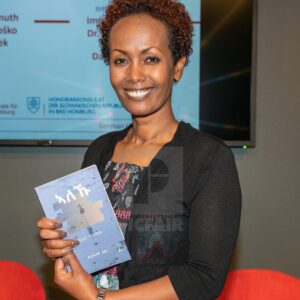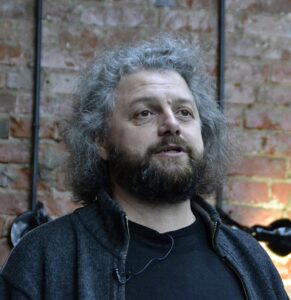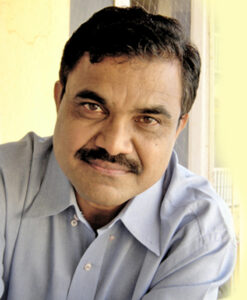Disturbing the Peace Award 2021: Short List of Nominees Announced
The Vaclav Havel Library Foundation’s Disturbing the Peace Award to a Courageous Writer at Risk honors distinguished writers of fiction and non-journalistic non-fiction who have been unjustly punished for challenging oppressive regimes. The award recognizes writers who share the values of Vaclav Havel, the Czech playwright who was imprisoned for his resistance to Czechoslovakia’s communist regime and was later elected the first president of democratic Czechoslovakia.
The five nominees for 2021 are:
• Yirgalem Fisseha Mebrahtu (Eritrea, living in Germany)
• Oleg Sentsov (Ukraine)
• Dmitri Strotsev (Belarus)
• Anand Teltumbde (India, in prison)
• Marcia Tiburi (Brazil, living in the U.S. and Europe)
The Disturbing the Peace award includes a $5,000 cash prize and, when circumstances permit, a writing residency in Prague prepared in partnership with the Vaclav Havel Library. The award will be presented by the renowned Eastern European author and former dissident Adam Michnik during the foundation’s annual Gala on September 23, 2021, at the Bohemian National Hall in New York.
In 2021, the following institutions provided the nominations:
About the nominees for the 2021 Disturbing the Peace Award:

Yirgalem Fisseha Mebrahtu is one of Eritrea’s most prominent poets and co-founder of the well-known literary club Adi-Kei. As one of Eritrea’s few women journalists, she worked with state and private media while regularly publishing poems, short stories, and articles. After the Eritrean government banned all private newspapers in 2001, she went to work as a producer and presenter at Radio Bana.
In 2009, Fisseha was charged with planning to assassinate the Eritrean president. She was convicted and imprisoned in a military prison without contact with the outside world. While in prison, she was subjected to severe abuse and required repeated hospital stays. Fisseha was not released from prison until 2015. Three years later, she fled Eritrea for Uganda, where she continued to publish poems and other works, including a well-received description of her experiences in prison.
Yirgalem Fisseha now lives and works in Germany. In 2018 she was recognized by PEN International and in 2019 received the PEN Eritrea Prize for Freedom of Expression. Her latest book of poetry, I Am Alive, appeared in October 2019 in Tigrinya.

Oleg Sentsov is a Ukrainian filmmaker and writer from Crimea, best known for his 2011 film Gamer. Sentsov was arrested in May 2014 in Crimea on suspicion of “plotting terrorist acts” after participating in the Euromaiden demonstrations that led to the overthrow of the Ukrainian president. Sentsov was also charged with helping deliver supplies to Ukrainian troops trapped during the Russian occupation of Crimea. He was sentenced to 20 years in prison, which caused an outcry among international human rights groups, who condemned his imprisonment as an effort by the Russian government to silence dissent.
Sentsov went on a 145-day hunger strike in 2018 to urge the Russian authorities to release all Ukrainians unfairly imprisoned in Russia. In 2018 he received the Sakharov Prize for Freedom of Thought from the European Parliament. He was released in September 2019 and continues to fight for freedom of expression and the freeing of other Ukrainian political prisoners.
Sentsov’s debut collection of stories, Life Went on Anyway, was published by Deep Vellum in 2019.

Dmitri Strotsev is a Belarusian Russian-language poet and publisher. Since the mid-2000s Strotsev’s poetry has described state repression in Belarus. In 2020, Strotsev emerged as leader of the unprecedented popular movement challenging the repressive Lukashenko regime. He described the political crisis in his poetic cycle Belarus Overturned, written in a distinctive style of “poetic reportage.” The cycle was a sensation in both Belarus and internationally and has been translated into more than 15 languages.
In October 2020 Strotsev was kidnapped and interrogated by the Belarus KGB. He was sentenced to 13 days of administrative arrest and confined to a punishment cell. Since his release from prison, Strotsev has continued to work on Belarus Overturned. In 2020 he received the Norwegian Authors’ Union Freedom of Speech Award with Belarusian poet Hanna Komar.
Strotsev is the author of seventeen books of poems. He has also published the Belarusian samizdat literature of the Soviet period and works by Minsk poets, including Belarusian and Yiddish authors of the interwar period and victims of Stalinist repression.

Anand Teltumbde is an Indian scholar, writer, civil rights activist, and public intellectual. He has written extensively on Dalit rights and the anti-caste movement in India. He is senior professor at the Goa Institute of Management and a columnist for the Economic and Political Weekly. He is actively involved in the Committee for the Protection of Democratic Rights and the All India Forum for Right to Education.
Teltumbde comes from a large farming family belonging to India’s lowest caste. His success despite immense social and cultural barriers and his defense of human rights positions him squarely against the ruling party, which favors the longstanding caste system.
In February 2019, Teltumbe was arrested during a government crackdown on lawyers and activists who were critical of Prime Minster Modi. More than 600 scholars issued a joint statement in his support, and more than 150 organizations and intellectuals signed a letter calling on the United Nations to intervene. On March 16, 2020, the Supreme Court dismissed Teltumbde’s plea for anticipatory bail, and he was ordered to surrender to the National Investigation Agency. Teltumbe remains in jail today.

Marcia Tiburi is a Brazilian writer and philosopher. She holds degrees in the visual arts and philosophy and has taught in universities across Brazil. Tiburi ran unsuccessfully for governor of Rio de Janeiro in 2018. Later that year she was forced to leave Brazil because of hundreds of death threats and harassment from political opponents of gender equality and women’s reproductive rights. Tiburi had a residency at City of Asylum in Pittsburgh in 2019.
Tiburi is the author of a wide-ranging oeuvre ranging from philosophical fiction to political tracts. She articulates concern for the environment, the rights of sexual minorities, feminism, and democracy. In her assessment of her country’s politics, she bemoans the “collective delirium” that keeps President Jair Bolsonaro in power. Her major work, How to Talk to Fascists, explores tanatopolitics or “death politics” as the means by which the ruling elite maintains control by condemning humans who are deemed “other.” Tiburi’s first novel, Magnolia, was a finalist for Brazil’s Jabuti Prize in 2006.
The 2021 Disturbing the Peace Award shortlist was prepared by a selection committee composed of:
Tamar Newberger, computer scientist and activist
Pavla Niklova, VHLF executive director
Martin Palous, former Czech ambassador to the United Nations and the United States, and
president, VHLF board of directors
Linda Sokacova, director, Amnesty International Czech Republic
Lise Stone, vice chair, VHLF board of directors
Salil Tripathi, chair, Writers in Prison Committee, PEN International
Marilyn Wyatt, former diplomat and vice chair, VHLF board of directors

